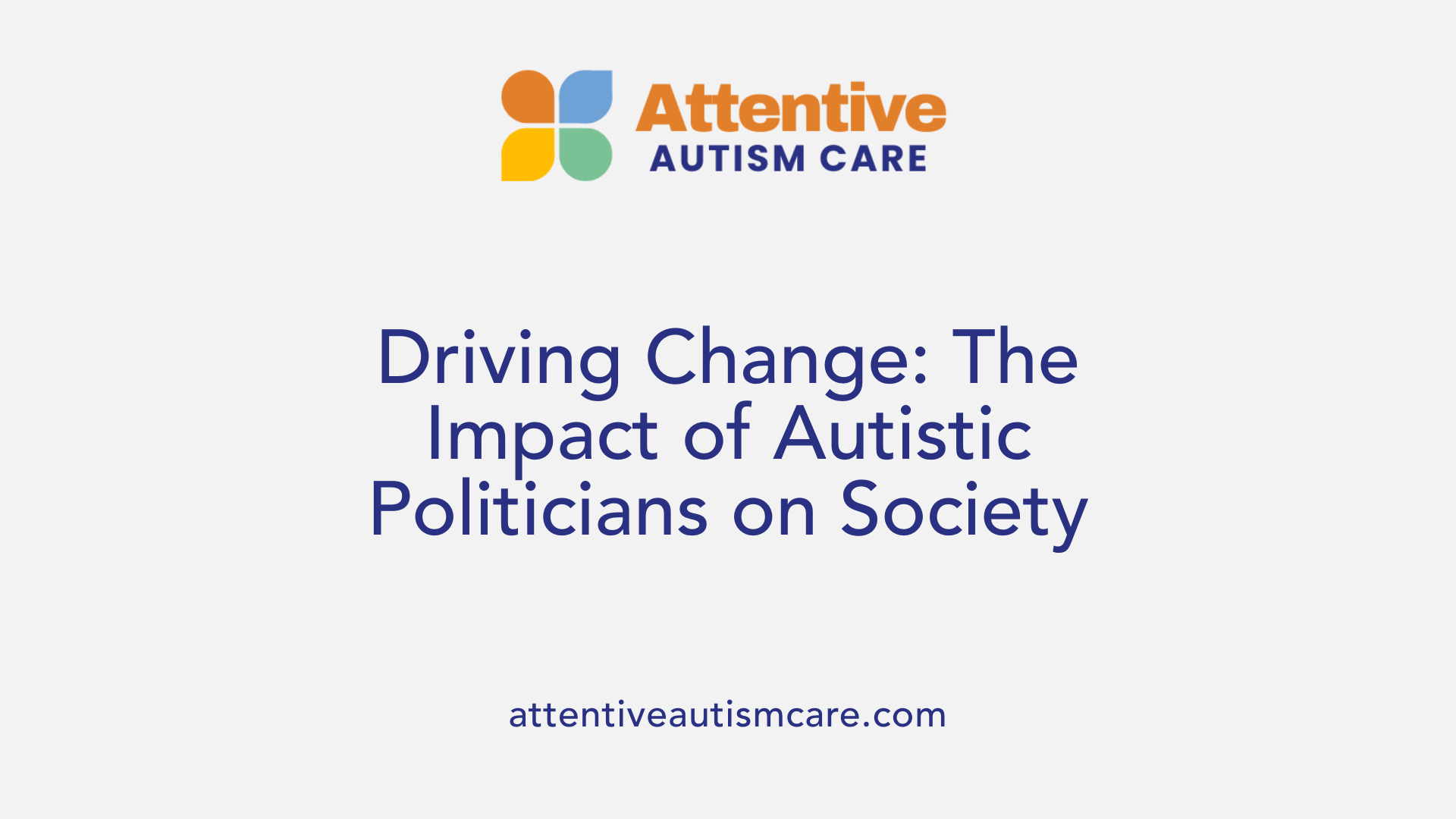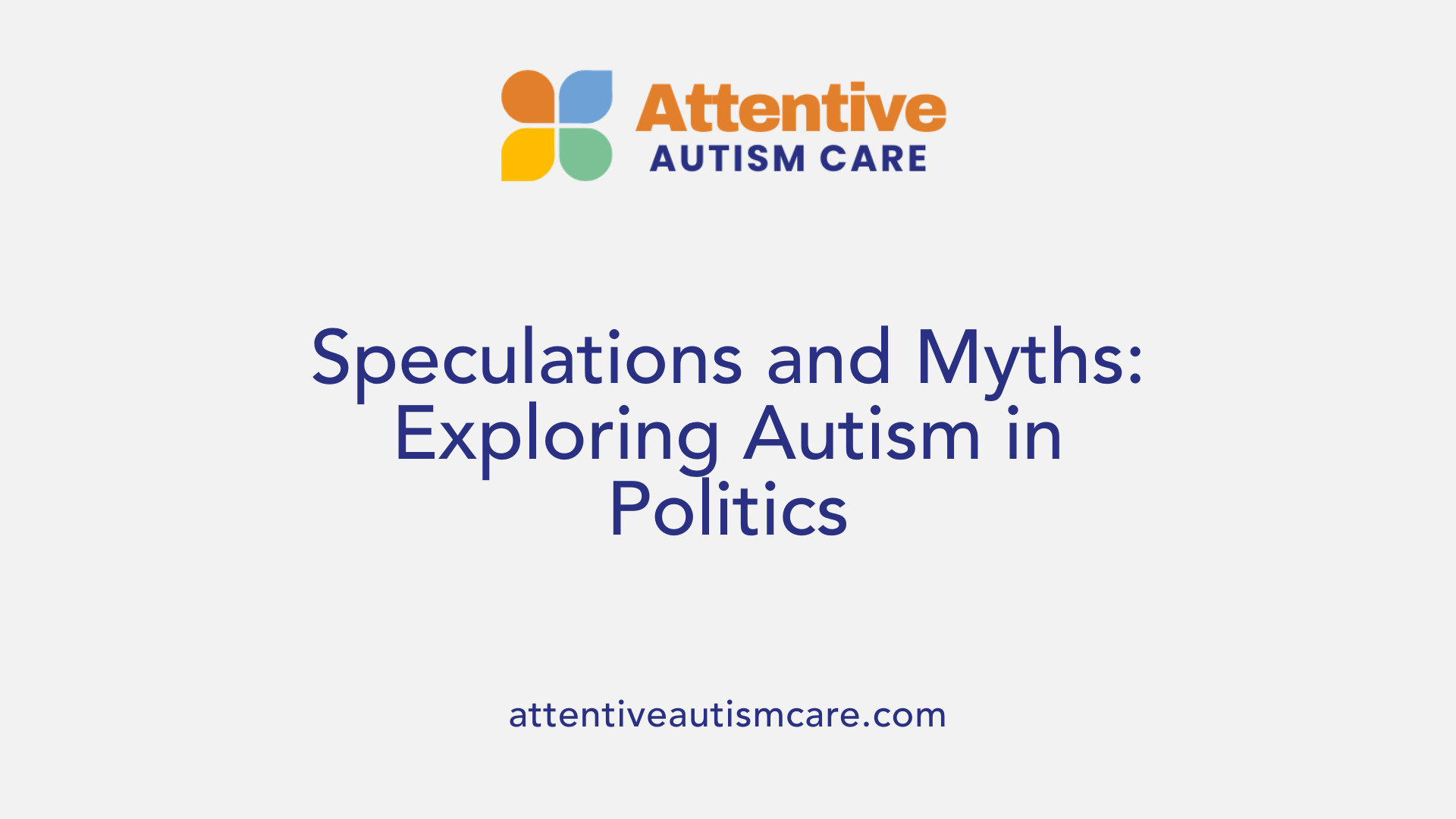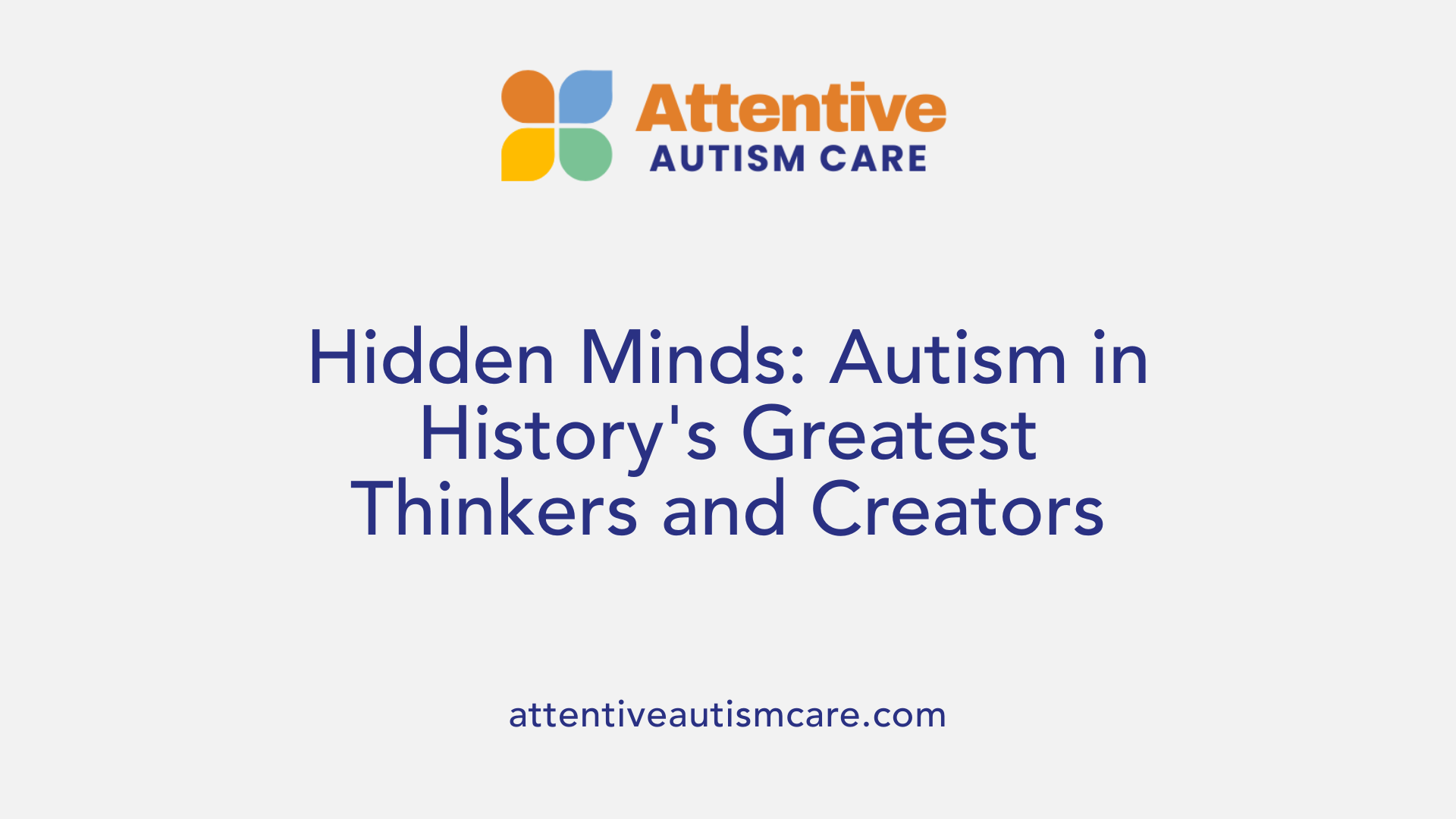Famous Politicians With Autism
Neurodiversity in Leadership: The Rise of Autistic Politicians

Breaking Barriers: Autism in the Political Arena
Autism spectrum disorder (ASD) has long been misunderstood and oftentimes stigmatized. However, recent years have witnessed an inspiring shift as neurodivergent individuals, including politicians, step into the spotlight. These figures not only challenge stereotypes but also bring unique perspectives that enrich policy debates and societal narratives. This article explores the lives, contributions, and advocacy of notable politicians with autism, highlighting their vital role in fostering greater awareness and acceptance.
The Role and Impact of Politicians with Autism

What is known about politicians with autism and their contributions?
Politicians with autism have become powerful voices in the advocacy for autism awareness, inclusion, and policy change. They often bring unique perspectives based on their experiences, helping to shape a more understanding society. A notable example is the concerted effort by Canadian senators like Marilou McPhedran, Wanda Thomas Bernard, and Jim Munson. These leaders actively participate in public speaking, legislative initiatives, and summits dedicated to autism, intersectionality, and societal inclusion.
Their involvement signals a significant shift in how society perceives autism and the capabilities of neurodiverse individuals. Many of these politicians are also active in promoting neurodiversity and emphasizing the importance of recognizing strengths rather than solely focusing on challenges. Their advocacy efforts help influence policies that aim to support autistic individuals in education, employment, and public services.
In the broader context, the participation of autistic self-advocates and leaders from the neurodiversity movement in policymaking highlights the evolving understanding of autism. It stresses the importance of listening to diverse voices and incorporating their insights into societal frameworks. This movement promotes the idea that autism is part of human diversity, not just a disorder to be fixed.
The influence of these politicians extends beyond national borders, impacting research priorities and clinical practices worldwide. Their work contributes to a global shift towards acceptance, respect for autonomy, and the right to civil rights for all autistic individuals. Their leadership demonstrates that neurodiverse individuals can drive meaningful change, fostering inclusive communities and more equitable policies.
| Politicians and Advocates | Contributions | Focus Areas | Impact |
|---|---|---|---|
| Marilou McPhedran, Wanda Thomas Bernard, Jim Munson | Legislative efforts, speeches, summits | Autism awareness, intersectionality, inclusion | Enhanced public dialogue, policy reform |
| Self-advocates and neurodiversity leaders | Policy input, activism | Empowerment, civil rights | Improved societal acceptance and support |
| Broader influence | Research, global practices | Support, rights, inclusion | Fostered worldwide shifts in thinking |
Overall, these leaders demonstrate how neurodiverse politicians enrich societal conversations, become catalysts for change, and advocate for policies that promote acceptance and equality for autistic people.
Notable Figures with Autism and Their Remarkable Stories

Can you provide profiles or stories of notable individuals with autism, including politicians?
There are many inspiring stories of well-known people with autism who have made significant contributions in their fields. These individuals come from various backgrounds, including activism, arts, science, and entertainment.
Greta Thunberg, a Swedish environmental activist, is one of the most prominent voices in climate change awareness today. She has publicly stated that her Asperger’s syndrome is her "superpower," giving her a unique perspective and drive to advocate for the planet.
Temple Grandin is a renowned animal science expert and advocate for autism. Diagnosed early in her life, she has shared how her autism gives her the ability to think visually and outside the box. Her innovations in animal handling and her extensive advocacy have influenced both science and public perception of autism.
Stephen Wiltshire, a British artist, is famous for his extraordinary talent in drawing detailed cityscapes from memory. Diagnosed with autism at age three, he uses his visual skills to create stunning artworks, illustrating how some autistic individuals excel in specific talents.
Other notable individuals include:
- Anthony Hopkins, acclaimed actor, diagnosed with mild Asperger’s, which he describes as helping his curiosity and insecurity.
- Courtney Love, singer and actress, who found her diagnosis as an “answer” that explained her feelings of being an outsider.
- Elon Musk, entrepreneur, revealed during a 2021 SNL appearance that he has Asperger’s syndrome, noting difficulties with social cues but emphasizing his different way of thinking.
- Sia, Australian singer, has shared that understanding her ASD has helped her feel more authentic.
- Alexis Wineman, the first Miss America with autism, showcasing that neurodivergence does not limit achievement.
Many public figures now openly discuss their autism to challenge misconceptions and inspire others. The stories of these individuals highlight how autism can coexist with success, creativity, and leadership.
| Name | Profession | Autism Spectrum Condition | Notable Fact |
|---|---|---|---|
| Greta Thunberg | Environmental activist | Asperger’s syndrome | Considers her diagnosis her “superpower” |
| Temple Grandin | Animal scientist | Autism | Innovator in animal welfare, visual thinker |
| Stephen Wiltshire | Artist | Autism | Creates detailed cityscapes from memory |
| Anthony Hopkins | Actor | Mild Asperger’s | Uses his traits to enhance his acting skills |
| Elon Musk | Business magnate | Asperger’s syndrome | Known for his innovative ideas and unique social perception |
| Sia | Singer | Autism Spectrum Disorder | Finds understanding of her ASD liberating |
This collection of stories demonstrates that many individuals with autism have achieved great things, inspiring others to see neurodiversity as a strength.
The Significance of Prominent Figures in Autism Advocacy

How does the presence of prominent political and public figures with autism help increase awareness and understanding of autism?
High-profile individuals who disclose their autism diagnosis play a vital role in shaping societal perceptions. When figures such as Greta Thunberg, Elon Musk, and Susan Boyle openly share their experiences, it helps the public see that autism exists across a wide spectrum of personalities, talents, and achievements.
These figures break down stereotypes by demonstrating that autistic individuals can excel in diverse fields — from environmental activism and science to arts and entertainment. Their visibility shows society that autism is not just about challenges but also involves unique strengths and perspectives.
Many of these individuals are also involved in advocacy, bringing attention to issues like neurodiversity and acceptance. Their public narratives challenge myths that autism is solely a disorder or limitation, promoting instead a view of autism as a natural variation of human cognition.
In policy and education, their influence often leads to greater inclusion. For example, their participation helps push for better support systems, workplace accommodations, and inclusive policies. When these leaders speak openly about their experiences, they create a broader understanding that fosters empathy and acceptance.
Overall, their openness and accomplishments inspire societal change. Many people are encouraged to embrace neurodiversity and recognize the valuable contributions of autistic individuals. Their prominence helps normalize autism and guides societies towards more inclusive attitudes.
| Aspect | Impact | Details |
|---|---|---|
| Increasing Awareness | Highlights diversity of autistic traits | Shows autism is not one-size-fits-all, encouraging personal understanding |
| Challenging Stereotypes | Demonstrates strengths and talents | Examples of success in arts, sciences, activism, and business |
| Promoting Acceptance | Reduces stigma and misconceptions | Personal stories humanize and normalize autism in the public eye |
| Policy Influence | Drives systemic change | Better educational, employment, and social support policies |
| Societal Perception Shift | Supports neurodiversity movement | Encourages society to value different cognitive experiences |
This visibility of renowned personalities continues to shift the narrative around autism, emphasizing resilience, capability, and diversity. As these figures influence millions worldwide, their role in transforming societal understanding remains crucial for fostering a more inclusive future.
Unconfirmed and Speculative Cases of Autism in Politicians
 While there are no publicly confirmed diagnoses of autism among well-known politicians, speculation and discussion often surround certain figures due to observable traits or behaviors. Many such discussions are rooted in attempts to challenge stereotypes about what it means to be autistic and to understand how neurodivergence might manifest across different personalities.
While there are no publicly confirmed diagnoses of autism among well-known politicians, speculation and discussion often surround certain figures due to observable traits or behaviors. Many such discussions are rooted in attempts to challenge stereotypes about what it means to be autistic and to understand how neurodivergence might manifest across different personalities.
For instance, some public figures are sometimes considered to exhibit traits typical of autism, such as social difficulties or intense focus on specific issues. However, these are not official diagnoses, and privacy concerns prevent many politicians from revealing such personal health information.
In the United States and other countries, a few politicians such as Ted Cruz or even former presidents like Donald Trump have been subjects of speculation. These discussions often highlight traits like directness, focus, or subdued social engagement, which can be misinterpreted as signs of autism.
There has also been commentary from experts and public figures encouraging a more nuanced understanding of these traits. For example, British psychologist Tony Atwood has spoken about how traits associated with autism can sometimes appear in any individual, regardless of their neurodiversity.
It's important to note that without formal diagnoses, these cases remain speculative. They serve as a reminder of the importance of respecting privacy and only discussing diagnoses that are publicly and explicitly confirmed. Overall, the focus should remain on fostering greater awareness and acceptance of neurodiversity without relying on assumptions based on behaviors or stereotypes.
| Person | Public Speculation | Known Facts | Additional Notes |
|---|---|---|---|
| Ted Cruz | Suspected traits | No official diagnosis | Traits include focus and directness |
| Donald Trump | Speculated basis on behavior | No diagnosis | Traits often misinterpreted |
| Others | Public discussion | No confirmed diagnoses | Aimed at raising awareness |
This ongoing dialogue informs how society perceives neurodiversity and promotes a more inclusive perspective beyond mere labels or assumptions.
Achievements, Challenges, and Advocacy of Autistic Politicians
What insights are available regarding the achievements, challenges, and advocacy efforts of autistic politicians?
Autistic politicians have made significant contributions through their advocacy and policy work, often highlighting the importance of inclusion, accessibility, and respect for autistic individuals. Many push for a move away from outdated, parent-centric views of autism, promoting self-advocacy and autonomy as empowering approaches.
Since the 1990s and 2000s, these politicians have prioritized raising awareness about the realities faced by autistic adults. They address issues such as discrimination, economic challenges, and the scarcity of resources and support services. Their efforts have helped shape public conversations around neurodiversity, influencing policy reforms and increased representation.
In countries like the UK, self-advocates on the autism spectrum have gained political influence, contributing to the development of more inclusive policies and community programs. These leaders often work to ensure that the perspectives of autistic individuals are included in legislation and societal decision-making.
Despite their accomplishments, autistic politicians encounter ongoing obstacles. These include misconceptions about autism, societal stereotypes, and structural barriers that impede political participation. Furthermore, harmful narratives perpetuated by media and charity campaigns can sometimes undermine their efforts and reinforce stigmas.
Their advocacy continues to challenge traditional narratives about autism, emphasizing strengths, talents, and the importance of societal acceptance. The collective movement of autistic politicians remains vital in shaping a more inclusive and understanding society.
Profiles of Public Figures Disclosing Autism in the Entertainment and Scientific Sectors
Several prominent individuals in the entertainment industry, science, and activism have openly shared their autism diagnoses, helping to destigmatize neurodivergence and serve as inspiration for many.
Greta Thunberg, the renowned Swedish environmental activist, proudly considers her Asperger’s syndrome her 'superpower.' She often speaks about how her diagnosis has been a source of strength and clarity in her activism efforts.
Actor Anthony Hopkins, celebrated for his versatile performances, publicly confirmed that he has Asperger’s syndrome. He has described his condition as a factor that fueled his curiosity and contributed to his growth as an artist. Hopkins mentioned that understanding his autism provided insight into his behavior and creative process.
Susan Boyle, who gained international fame through Britain’s Got Talent, revealed she was diagnosed with Asperger’s later in life. She expressed that the diagnosis brought her relief and a greater understanding of her experiences, such as feeling like an outsider and overcoming challenges.
Entrepreneur and innovator Elon Musk shared during a 2021 appearance on Saturday Night Live that he has Asperger’s syndrome. Musk discussed how his unique way of thinking and perceiving social cues affected his interactions but also fueled his creative and technological innovations.
The singer Sia has been candid about her ASD diagnosis. She has spoken about feeling more authentic and comfortable in her own skin after accepting her neurodivergence, shedding light on how autism shapes her artistry.
These disclosures from influential figures not only help to normalize autism but also encourage others to embrace their neurodiversity.
| Name | Field | Disclosed Condition | Public Remarks |
|---|---|---|---|
| Greta Thunberg | Environmental Activist | Asperger’s Syndrome | Calls it her 'superpower.' |
| Anthony Hopkins | Actor | Asperger’s Syndrome | Describes it as fostering curiosity and growth. |
| Susan Boyle | Singer | Asperger’s Syndrome | Finds self-understanding and relief. |
| Elon Musk | Entrepreneur, Scientist | Asperger’s Syndrome | Talks about social challenges and innovation. |
| Sia | Musician | ASD | Feels more genuine after accepting her diagnosis. |
Understanding and acceptance are greatly advanced by these high-profile disclosures, promoting a more inclusive view of autism across society.
Historical and Retrospective Speculations of Autism in Great Thinkers and Artists

Are there examples of historical figures believed to have had autism?
Many experts and authors have speculated that some historical figures might have been on the autism spectrum. Notable among these are Albert Einstein, Isaac Newton, Jane Austen, Wolfgang Amadeus Mozart, and Nikola Tesla. These individuals are often analyzed posthumously based on their behaviors, personalities, and life patterns.
Traits such as late speech development, intense focus on particular interests, social difficulties, sensory sensitivities, and repetitive behaviors are cited as clues that they may have had autism or Asperger's syndrome. For example, Einstein reportedly had delayed speech as a child and displayed a deep fascination with complex scientific ideas. Mozart's repetitive musical patterns and social quirks are also interpreted through this lens.
It is important to recognize that these diagnoses are retrospective — they are not confirmed with modern clinical assessments, which were unavailable at the time. Still, these theories help in understanding how autism might have influenced their groundbreaking contributions in science, music, and literature.
The idea that many influential figures in history might have been neurodiverse broadens our appreciation for the diversity of human cognition. Their unique ways of thinking and perceiving likely played a role in their remarkable achievements.
| Historical Figure | Notable Traits and Behaviors | Support for Autism Belief |
|---|---|---|
| Albert Einstein | Late speech, hyperfocus on physics, social difficulties | Obsessive interest in science, social quirks |
| Isaac Newton | Reclusive, intense focus, obsession with work | Social withdrawal, obsessive tendencies |
| Jane Austen | Social difficulties, intense focus on writing | Social quirks, preference for solitude |
| Wolfgang Amadeus Mozart | Repetitive musical routines, sensitivities, social eccentricities | Repetitive behavior, sensory sensitivities |
| Nikola Tesla | Obsessive routines, creativity, fixation on inventions | Intense focus, social challenges |
While these speculations remain unconfirmed, they add a rich dimension to the ongoing dialogue about neurodiversity throughout history. Recognizing these possible connections helps us appreciate how diverse minds have shaped our world.
Broader Impact
Understanding that celebrated thinkers and artists may have been on the spectrum encourages a more inclusive perspective. It emphasizes that traits associated with autism can contribute positively to creativity, innovation, and problem-solving.
Exploring these historical examples fosters greater awareness and acceptance of neurodiversity, inspiring modern society to value different ways of thinking and perceiving the world.
Embracing Neurodiversity in Leadership and Society
The stories and contributions of famous individuals with autism, especially those in the political realm, underscore the importance of neurodiversity. Their achievements challenge outdated perceptions and inspire societal shifts toward greater acceptance and inclusivity. As awareness grows and diagnoses become more accepted, the potential for neurodivergent leadership to influence policies, inspire innovations, and foster understanding is immense. Continued advocacy, representation, and open dialogue are vital for building a future where every individual's strengths are recognized and valued.
References
- 20 Famous People With Autism - Autism Parenting Magazine
- 9 Famous People Who Have Autism - Everyday Health
- Famous Autistic People - On The Spectrum Foundation
- Famous People With or Had Asperger's Syndrome - Disabled World
- Autistic celebrities: 71 famous people with autism (2023 edition)
- Autistic people in the public eye | Autism Space
- CALS2025 Program - Autism Alliance of Canada
- Autistic Self-Advocacy and the Neurodiversity Movement - Frontiers
- Famous & Influential People With Autism Spectrum Disorder




































































































